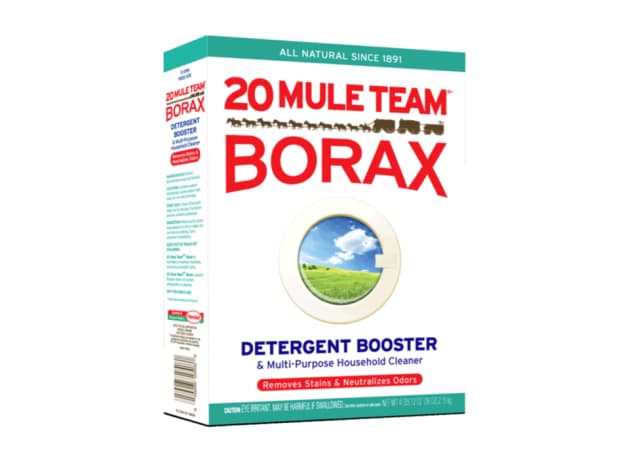
Ask an Expert: Reasons to Wash Your Clothes in Cold Water
See how making the switch from warm to cold water can save money (and your clothes).
Read More


Last Updated: August 12, 2022
Comforter bunched and twisted? Unsure how to even wash a down comforter? With our simple guide, you’ll be back to a clean comforter and cozy bed in no time.
All of the down in your comforter suddenly down at your feet? We’ve been there. After you read our down comforter cleaning guide, you’ll be warm and cozy in all directions — no dry cleaners necessary! While laundering items like pillowcases, sheets, and duvet covers is easy, cleaning some of your bigger, bulkier bedding items is more challenging.
One of the most intimidating bedding items to clean is the down comforter. Often made from feathers and plumules from ducks and geese (although vegan and synthetic options exist!), down comforters can seem unwieldy to clean. They’re big, heavy, delicate, white, clumpy, and temperature-sensitive — meaning many people simply drop their comforter off at the dry cleaners to avoid dealing with it altogether. Considering the potentially harmful chemicals dry cleaners use — chemicals that’ll off-gas into your bedroom air and even directly into your face — there has to be a better option.
Since most down comforters can be washed at home, we’re here to walk you through the process. Follow this guide, and you’ll have a fresh, clean comforter — without a big bill to show for it.
If done properly, no, washing a down comforter will not ruin it! Like all delicate textiles, there are a few things to keep in mind to avoid permanently damaging your down comforter.
Using properly sized laundry machines, delicate cycles, mild temperatures, and mild detergents are all things to keep in mind. Fear not – we'll break down these details and more during the step-by-step instructions below.
Sans any major spills, you should clean your down comforter once every one to two years. If you have a removable duvet cover on your comforter that you can take off and wash, cleaning your down comforter once every two years is plenty.
Probably not, but maybe. Here’s how to know:
The first thing you’re going to want to do is check both the manual for your washing machine and the care tag for your down comforter. At-home and in-unit washing machines are usually too small, top-loading, or equipped with agitators — all things that prevent proper down comforter cleaning.
Many apartment buildings with laundry rooms use front-loading washing machines, but they will likely be too small for a comforter that is any larger than twin-sized. Unless your building has an additional extra-large washer and dryer unit, your best bet will be to find large ones elsewhere to wash and dry your comforter in.
Your local laundromat will have the gigantic, roomy washers and dryers that are perfect for your large down comforter. Most laundromats use extra large, front-loading washing and drying machines, ideal for a spacious, proper clean.
If your down comforter is extra big (or crunchy,) you may need multiple wash and drying cycles, so be sure to bring plenty of quarters and a lot of dryer balls (which help speed up drying times) with you to operate the machines.
Washing a down comforter just requires a mild detergent and dryer balls. Easy, right?
Instead of special tools or soaps, the most important element is the washing machine itself — a roomy machine gives your comforter space so that the whole thing gets thoroughly washed, rinsed, and dried without twisting or bunching.

Intense temperatures on either end of the spectrum can harm a down comforter.
If the wash water is too hot, the down can singe or burn. Too cold, and the down can clump and lose some of its soft touch. A warm cycle wash is the ideal middle ground for a down comforter.

Like intense temperatures, intense spin cycles, agitation, and general tossing can lead to clumping, bunching, twisting, and tearing — all in all, an uneven clean for your down comforter.
A long, gentle cycle avoids all those potential issues and leads to a nice, even clean.

For most down comforters, a single load’s worth of any mild, gentle, or natural detergent will do the trick.
Down detergent, or down wash, is most commonly used on down jackets and coats, specially made without harsh chemicals like bleach and sulfates, which can damage your down.
Dryer balls are natural drying aids that will help speed up the time it takes to dry big items and leave them feeling soft after washing too.
GROVE TIP
Harsh laundry detergents are terrible for down, stripping it of its natural, protective, insulating coating. But you’ll also want to forego the fabric softener — and detergents that contain softeners — since they leave a harmful coating on your down material that reduces its fluff, increases clumping, and decreases warmth — turning your down into a downer.
Drying your down comforter requires a lot of one thing: patience. Depending on the size of your comforter, it can take anywhere from 2–4 hours to fully dry, but wool dryer balls can help cut down on time.
We don't recommend air-drying a down comforter. If the down on the inside is not completely and thoroughly dried, it can quickly develop mildew and mold. Not only that, air drying a down comforter takes forever.

Stick to a large, front loading dryer.
Similar to the wash cycle, stick to the delicate, low-temperature settings. Intense dryer temperatures, even more than intense water temperatures, can damage the down — taking the comfort out of the comforter — so patience is key.
One highly recommended item for drying a down comforter is wool dryer balls — and lots of them.
Wool dryer balls act as safe agitators, creating more space for warm air to travel throughout the comforter. Throw at least a half dozen wool dryer balls (or a few tennis balls, in a pinch) in the dryer for faster, more even drying.

Throughout the drying process — every hour or so — stop the dryer, take out the comforter, and give it a good shake.
Fluffing it up will help keep the interior down evenly distributed so it dries evenly.
Once it’s dry, hang the comforter from a clothesline, or drape it across some chairs, to air it out on all sides. Let it hang for an hour or so, then put it back on your bed, and enjoy!

See how making the switch from warm to cold water can save money (and your clothes).

We've pulled the 16 best natural laundry detergents for dark clothes that have been top-rated by Grove members.

Learn about zero-waste laundry soap sheets and how they actually work from Lead Grove Guide Angela Bell.

20 Mule Team Borax is a popular powder cleanser and laundry booster. But how does it really hold up to tough stains?